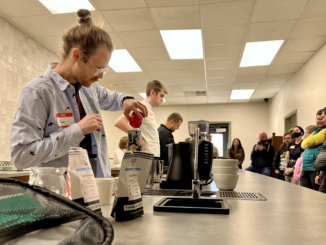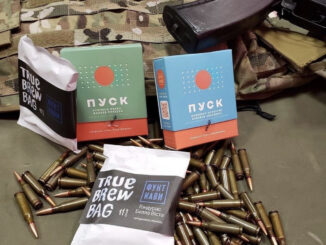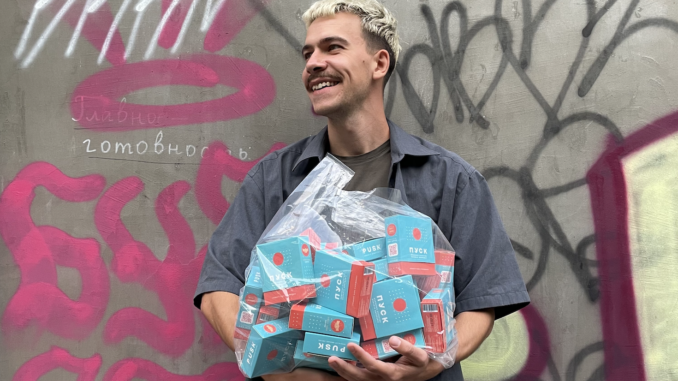
Funt Coffee’s Vladyslav Demonenko is Ukraine’s 2019 Coffee In Good Spirits champion; he fills us in on the resilience of his coffee community during a time of war in his country.
BY CAROLINE CORMIER
SPECIAL TO BARISTA MAGAZINE ONLINE
Cover photo by Anna-Mariia Oriekhova
At just 25 years old, Vladyslav Demonenko is already well-known in the coffee community of Ukraine. Before discovering the coffee world, Valdyslav was a doctor. However, he realized how much he loved the people behind coffee, and he felt he could be more of his carefree self while working in it. He became passionate about specialty coffee in particular while working at a dessert shop called DoubleDecker, eventually ending up at Funt Coffee in 2015.
In late 2017, Vladyslav became the company’s head barista. He has won the national Coffee In Good Spirits (CIGS) championship in Ukraine twice, representing his country in Berlin at the 2019 World of Coffee event, where he ranked seventh in the world. Vlad, as he’s known in his personal circles, had been preparing to compete on the world stage again at the 2022 World of Coffee (WoC) event when Russia invaded Ukraine on February 24 of this year. Like millions of Ukrainians, his world was abruptly shattered.
I had the opportunity to catch up with Vlad recently to learn more about the situation in the city of Dnipro in the past months. I also found out what his role as a barista has been like in the context of the war, and what his thoughts are about the future.
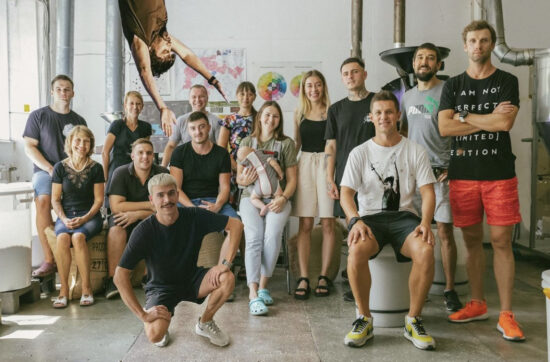
Caroline Cormier: Thank you so much for taking the time to speak with me, especially given the circumstances in Ukraine. Before the war, what did your day-to-day look like at Funt Coffee?
Vladyslav Demonenko: Well, I’m the head barista at Funt, which means that I am responsible for sourcing coffee and ensuring the overall quality of coffee in the company and, especially, in our coffee shops. In the city of Dnipro, there are now eight locations where I oversee the quality of training staff and come up with themed drinks. I also regularly experiment and try to create new projects related to coffee. A recent project included creating the first specialty instant coffee in Ukraine. It’s called PUSK and it’s become pretty popular. In general, though, I spend a lot of time multi-tasking and I really enjoy it. Sometimes I am searching for candidates for jobs. Other times, I am scoping out the best coffees in Central America or Africa.
Every day looks a bit different, but I suppose a typical day would start with a trip to the coffee shops and a morning check of the quality of the drinks. I’d then head over to the roastery to control the samples and discuss plans for the week with my colleagues. This might be followed by a trip to the PUSK factory. For me, though, the best part of any day is meeting friends for lunch and enjoying an afternoon coffee with them.
Would you mind sharing with us a little about what life in Dnipro has been like since Russia invaded Ukraine?
I remember the initial hours of the war very well. It was about 5 a.m. when I heard explosions for the first time. At first, I didn’t quite realize the significance of it, but then immediately after a friend called me to tell me that the bombing had begun. Since the days before, we had talked about the possibility of a war. We had even started packing backpacks with our most important personal belongings—some clothing, documents, money, insurance, and food for a few days—just in case we had to leave the city quickly.
It all felt a little surreal at the beginning. I’d woken up on February 24 in such a state of shock that my first thought was about the cupping that I had scheduled for a group at one of our coffee shops later that day. As soon as I got outside, I saw how everyone was scrambling to leave. There were kilometer-long queues at gas stations and ATMs. No one understood what exactly was happening and what needed to be done. The whole situation was alarming. This level of panic lasted another two or three days—and much of the city became empty as more and more people fled westwards.
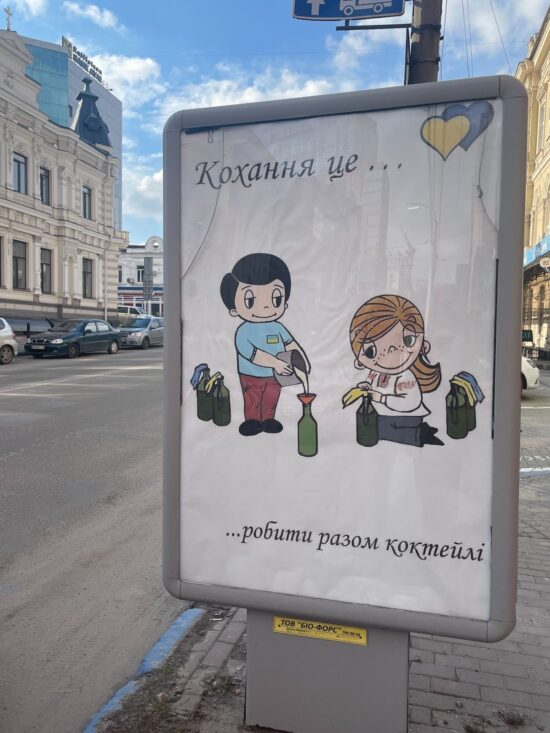
By the second or third day of the war, volunteer centers were opened in different places around the city (and these are still operating today). What happened there was incredible. People from all walks of life came together—some were part of existing and familiar networks, but many were complete strangers. Even though parts of the whole city seemed empty—almost desolate—the centers were spaces where everyone came together to help those who were at the front. This included packing food, coffee, and other stuff for those on the front lines.
We also made Molotov cocktails to help protect our city. Everyone was determined to help however they could, and they did so with the knowledge that they were all contributing to a common goal. If I were to describe it, I’d say that there was almost an atmosphere of euphoria at these centers. I helped with collecting and sorting donations of necessary supplies, and I also distributed food and coffee to those who needed it.
And what about your everyday life? How did it change in these past months?
Well, as you can probably imagine, my day-to-day life has changed a lot—and it keeps changing. Everyone around me is under stress 24 hours a day. Many people are exhausted, and unable to sleep at night because of the frequent attacks and alarms. In the beginning, it was necessary for someone to stay up all night to wake everyone up when there was danger and lead them to the cellar for shelter. Now there is an official app that serves this very purpose—warning of air raids and directing people to the nearest bomb shelters.
At some point, I think you get kind of used to the situation that you’ve been forced into, even though there’s a lot of sadness and confusion about what is happening. I am lucky that my friends are with me though. We’ve been supporting each other since the beginning—especially those of us from the Ukraine coffee community. From early on, we began gathering to discuss plans and strategies, thinking about how we can help save coffee shops and jobs in our field.
You’ve also had a chance to put your medical education to use during these months in Ukraine, isn’t that right?
Yes, early on I decided that I wouldn’t let my medical education gather dust on the shelf, and I knew that an extra set of hands would not be superfluous. While our coffee shops were closed, I helped in the burn center in Dnipro, where civilians and military personnel who received burns and polytrauma were admitted. I was responsible for things like dressing wounds, transporting patients, administering injections, etc. These were basic things, but given the number of patients, they were needed in large quantities. I did this for about three weeks until there were enough nurses on-site to do these tasks. After that, I brought thermoses with filter coffee for the patients and doctors.
We will continue this story in future posts.
ABOUT THE AUTHOR
Caroline Cormier (she/her) is a freelance writer from Toronto, Canada. She currently lives in Berlin, Germany, where she’s been supporting local efforts to help Ukrainians who have fled to the German capital. You can follow her on Instagram at @ccormier_.


